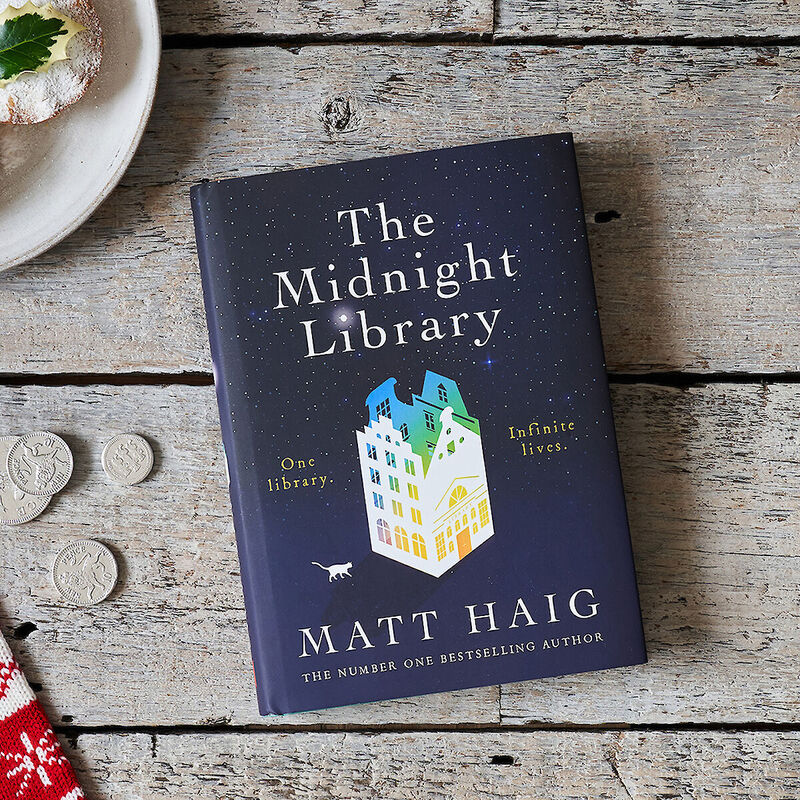Book Review of Matt Haig's The Midnight Library

Matt Haig’s The Midnight Library tells the story of 35 year old Nora Seed, following the night she takes an overdose. The various things wrong with Nora’s life emerge quite quickly. She had a difficult father, she became ostracized from her brother when she jumped ship on the band they were in together, just as it started to be successful. Her best friend is upset with her for not joining her in Australia. Just when things seem pretty much at rock bottom she is fired as a piano tutor by the single student she has and her cat dies!
It doesn’t take long for all the factors leading to Nora’s suicide to emerge. Neither does it take long to figure out how Matt Haig is going to present his message to us. In a between life and death state, Nora finds herself in a large library where, as long as it stays midnight, she has the option to try out all the lives she might choose to live. The process of doing so enables her to eradicate the numerous regrets she has. Nora tries on many lives, from olympic swimmer, rockstar, wife of a famous musician, wine producer and countless more. What becomes apparent is that every life leads to different choices which not only affect her, but also the lives of other characters.
As a child Mrs. Elm, the school librarian was always kind to Nora and it is she who comforted her when she received the news that her father had died. It makes sense then that it is Mrs. Elm who navigates Nora through the library.
In the story, The Midnight Library, Nora is intelligent and aritculate. She is also afraid of life. She knows that her brain is tricking her and she is acutely aware that whatever choices she makes she is living as a kind of imposter. She returns time after time too her ‘root life,’ until finally the decision has to be made about whether she will live or die.
As readers, we are left questioning whether Nora is actually in her ‘root life’ or whether that is simply one among many parallel existences.
Book Discussion Questions on Matt Haig's The Midnight Library
- Of all the lives that Nora experiences which would you most like to sample?
- If you could invent a parallel life what would happen in it?
- In the life when Nora wasn't teaching Leo piano, he found himself frequently in trouble with the police. What point is Haig making? How convincing do you find this point?
- It was after Nora's cat died that she took an overdose. She felt that she hadn't even been able to look after an animal properly. How significant would a pet be to you in maintaining good mental health?
- I've suggested that the book is aimed primarily at teenagers? Do you agree? Why, or why not?
- Do you believe in the possibility of the existence of parallel lives?
- Who would you cast as the main characters if The Midnight Library was a film?
- Before she took an overdose Nora contacted the brother from whom she was estranged to tell him she loved him. Discuss why she does this?
- What do you think will happen to Noral in her root life in The Midnight Library?
- Mrs. Elm is presented as a stereotypcially kind and gentle librarian. We learn at the end of the book that she has made lots of mistakes in her own life. Why do you think Haig includes this detail about Mrs. Elm?
- The chapters varied in length and were often dependent on the amount of time Nora spent in a parallel life. The chapter headings were often very wordy and gave detailed summaries of what was about to happen? Discuss what you liked and disliked stylistically about the book.

Book Discussion Questions on The Midnight Library (if you haven't read the book!)
- Who would be the final person you would contact if your life was coming to an end?
- Nora was fired from her job at the music shop because she wasn’t cheerful enough? Is this a good enough reason to get fired?
- Nora talks about how one small action impacts other actions. Share an incident where something you have done in life has had a dramatic knock on effect.
- Life is a journey that we are just passing through. Discuss what this comment makes you think.
- A key theme in the book is that of ‘regrets’. Do you have any regrets that you wish to share? Does it serve any purpose having regrets? Discuss.
- Nora says towards the end of the book “I Am Alive”. What does being alive mean to you?
- This book is dealing with a suicide attempt. Although it is ultimately uplifting there are several points in it which make pretty grim reading. Should books which address poor mental health have a warning on them?
- In one of Nora’s lives she goes to Australia and stays for a while even when her life is terrible. Why do people stay in situations that don’t add positively to their existence?
- The book has lots of references to famous philosophers and other references that are linked to literature and popular culture. For example she refers to both Adichie and Judith Kerr’s The Tiger Who Came to Tea. Do you enjoy books that are set in a particular time and place in history or do you prefer books that seem more timeless?
Personal Response to Matt Haig's The Midnight Library
I quite enjoyed Matt Haig’s The Midnight Library. I respected the message that Haig was putting across. He includes a lot of signposts for how we can look after our mental health. In The Midnight Library, Haig is teaching us that regrets don’t help us move forward. We can’t actually change the past, but we can choose our futures. We can’t guarantee they are perfect, but we can live them. I could appreciate that message. There are whole passages in the book that are worth having as a mantra to live by. For anyone struggling with their mental health, it is well worth revisiting these sections.
Like a lot of readers, I’ve struggled to concentrate in recent weeks. I wrote about managing coronavirus stress some weeks ago, so I was happy enough to enjoy the obvious direct nature of Haig’s writing style. As I read The Midnight Library, I kept thinking it must have been written with a teen fiction audience in mind, as the message does get hammered home. I think it is fair to say that Matt Haig’s The Midnight Library, is linear and lacks subtlety.
When I was reading it felt, at times, like Haig had returned to chapters already written and added in a bit of extra text to make sure that the reader hadn’t missed any of the intended message. This gave it a slightly didactic feel. The story reminded me a bit of Life on Mars, with that whole between life and death feeling. In terms of choosing different lives, it is a bit like Kate Atkinson’s Life After Life. Life After Life is a more sophisticated book though. The character Nora, in the story has studied philosophy, but I don’t really view this as a philosophical text. It’s more a cross between self-help and fiction.
If you follow my book blogs, you’ll know that of late I’ve become quite obsessed with Richard Holloway and have recently read Waiting for the Last Bus. I think he would highly recommend The Midnight Library to readers. It covers the big questions. It’s a totally different level and style of reading to Waiting for the Last Bus, but the messages of both are not so different. I enjoyed the book and found parts of it quite profound, but I felt like it needed another round of editing to move it from an okay book to a really good read.